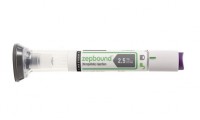-
Bristol Myers Squibb’s CAR-T Breyanzi wins FDA priority review
- Source: drugdu
- 96
- November 14, 2023
-
Takeda’s Fruzaqla receives FDA approval for metastatic colorectal cancer
- Source: drugdu
- 98
- November 14, 2023
-
Valneva’s chikungunya vaccine approved by FDA for adults at increased exposure risk
- Source: drugdu
- 98
- November 14, 2023
-
Takeda Wins FDA Approval for Fruquintinib in Certain Colorectal Cancer Patients
- Source: drugdu
- 108
- November 13, 2023
-
FDA Amends Approved Indication for Keytruda in Gastric Cancer
- Source: drugdu
- 114
- November 13, 2023
-
FDA Approves Takeda’s Treatment for Rare Blood Clotting Disorder
- Source: drugdu
- 101
- November 13, 2023
-
Eli Lilly’s tirzepatide injection approved by MHRA and FDA for weight loss in adults
- Source: drugdu
- 104
- November 13, 2023
-
With FDA approval, Eli Lilly’s weight-loss drug Zepbound arrives to challenge Novo Nordisk
- Source: drugdu
- 103
- November 10, 2023
-
Janssen Sends Data for Phase III Children’s Pulmonary Tuberculosis Treatment to FDA and EMA
- Source: drugdu
- 134
- November 10, 2023
-
FDA Approves Eli Lilly Weight Drug, Now Set to Compete Against Novo’s Wegovy
- Source: drugdu
- 105
- November 10, 2023
your submission has already been received.
OK
Subscribe
Please enter a valid Email address!
Submit
The most relevant industry news & insight will be sent to you every two weeks.













